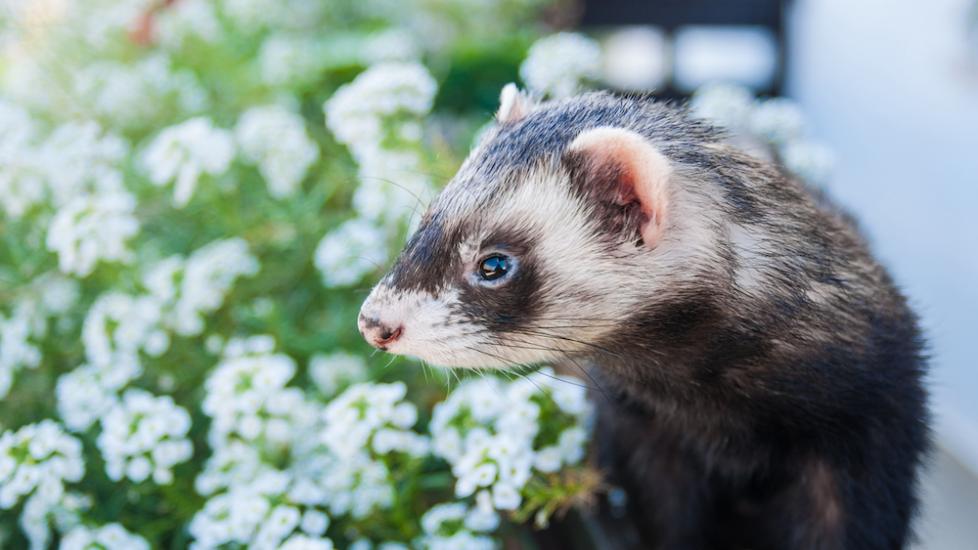How Long Do Ferrets Live?
Ferrets can be perfect pets for the right family. When choosing a new pet, their longevity and specific needs should factor heavily into the decision. Exotics and pocket pets also have more requirements than traditional pets to lead a happy, healthy, and long life. Pet parents can maximize their time with their furry family members by working with a veterinary team and thoroughly researching the species before bringing them home. With the proper care, ferrets can bring their families years of joy.
Average Ferret Lifespan and Aging
Ferrets were most likely domesticated from the European Polecat and used initially for rodent hunting. Domesticated ferrets are not the same species as the wild ferret species in the U.S,. the endangered Black Footed Ferret. Ferrets in captivity typically live 4–6 years, while their wild cousins may only live 1–3 years since they don’t have veterinary care, proper shelter, and regular balanced nutrition.
Female ferrets may have 2–3 litters a year and are full size at 6–7 months. Young ferrets are called kits and are considered full-grown at a year old. Large companies or breeders breed ferrets in the U.S., and they are usually spayed or neutered at six weeks old.
There is only one breed of ferret—the standard ferret. A subset of ferrets with a genetic mutation has long hair and are called the Angora ferret, but it is still the same species. Captive ferrets come in various colors, the most common being sable and albino. Other colors and pattern variations include:
-
Black
-
Black sable
-
Champagne
-
Chocolate
-
Panda
-
Dark-eyed white
-
Roan
-
Colorpoint
-
Siamese
Generally, the more uncommon or unique the color and pattern, the more likely a ferret is to have genetic issues that make them sick and affect their lifespan. Color variations that create white on the head (such as panda patterns) may cause deafness at birth, a condition known as
Ferrets in captivity typically live 4–6 years, while their wild cousins may only live 1–3 years.
What Makes Some Ferrets Live Longer Than Others?
The healthiest ferrets typically have the most genetic diversity and are less inbred. However, they always require proper care at home, nutrition, and veterinary to lead their healthiest life.
A proper diet is essential to keep ferrets healthy and increase their lifespan. They are carnivores, requiring a high protein, low carbohydrate diet. While some cat diets may fit this requirement, ferrets should be fed a ferret-specific diet formulated to meet their specific nutritional needs with correct vitamin and nutrient values.
Ferrets are inquisitive creatures by nature that can easily squeeze into small spaces. They explore the world with their mouths by biting and tasting new objects. Because of this, pet parents must carefully supervise their ferret whenever outside their cage.
Ferret-proofing a house includes removing anything that could hurt the ferret such as electrical cords or preventing falls from high surfaces. Ferrets will steal and hide food items and eat items too big for their stomach. As such, common medical issues with ferrets (especially young) include gastrointestinal obstruction from consumed items and traumatic injuries. Other typical diseases of ferrets, especially as they age, include:
-
Adrenal disease
-
Lymphoma
-
Insulinoma
-
Gastrointestinal issues
A healthy ferret is bright, alert, and curious. The coat is shiny, with no bald spots or flakes. There is no eye or nose discharge or lumps and bumps throughout the skin. Regularly consult a veterinary professional familiar with ferrets with any indication of illness.
How to Improve Your Ferret's Lifespan
Ferrets are relatively easy to care for, but providing high-quality husbandry and veterinary care can help extend their lives while bonding them to their families for those years. Typical recommendations for improving your ferret’s lifespan include the following:
-
Regular veterinary care visits, including blood work
-
Vaccinate ferrets against rabies and canine distemper
-
Always supervise ferrets when outside of their cage
-
Cages should be at least 3 feet x 3 feet with bars small enough not to allow a ferret to sneak through
-
Provide environmental stimulation with toys, hammocks, and ladders in the cage
-
Allow 3–4 hours a day for supervised play outside the cage
-
Feed a ferret-specific diet high in protein like Oxbow Ferret Food
-
Create safe places in their cage with places to hide and feel comfortable
-
Train ferrets to use a litter box and clean the cage bedding frequently
-
Use preventative topical products to prevent flea and tick-borne diseases.
-
Brush teeth daily and monitor for painful periodontal disease
Featured Image: iStock.com/sestovic
References
Schoemaker DVM, PHD, Nico J. van Zeeland DVM, MVR, PhD, DECZM, Y.R.A. Merck Veterinary Manual. Overview of Ferrets. 2022.
Morrisey DVM, DABVP(Avian), Jamkes K. Merck Veterinary Manual. Overview of Ferrets. 2022.
Kiefer DVM, Kristina M. Johnson DVM, Dan. A Quick Reference Guide to Unique Pet Species: Ferret Pet Care. 2011.
Mitchell DVM, DABVP, Sandra. Veterinary Partner. Ferret Husbandry. 2021.
Pollock DVM, DABVP (Avian Practice), Christal. Lafeber Vet. Basic Information Sheet - Ferret. 2019.
